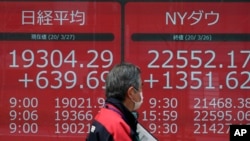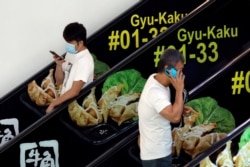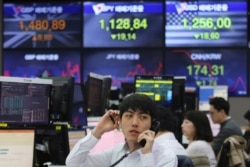A dozen Asian countries plan to offer economic stimulus aimed at helping companies cover lost business during the COVID-19 pandemic, but not all of them are expected to help employers retain workers and reopen once the outbreak subsides.
Japanese, Singaporean, South Korean and Taiwanese efforts are expected to make the biggest difference because those countries are seen as managing their budgets well and giving aid in a fair way. Stimulus packages in those countries should make up for 40% to 50% of losses among companies, said Anwita Basu, head of Asia country risk research with Fitch Solutions, an investment rating firm.
“They do have enough to sort of see them through without a massive employment and economic hit at the moment,” she said.
Countries with smaller budgets or less practice in dispersing funds to companies in the most need would prove less effective, analysts say. They point to India, Indonesia, the Philippines and Vietnam as likely problem points.
Singapore’s state reserves
Singapore’s combined stimulus of $37.57 billion will prop up major companies and give money directly to citizens. Some funding will come from the Asian financial hub’s reserves. Singaporean companies have lost money because of slowdowns in tourism and conferences during the global virus outbreak.
Singapore’s budget is “not an issue,” said Song Seng Wun, an economist who lives there and works in the private banking unit of CIMB, a bank headquartered in Malaysia.
Japan, South Korea
South Korea’s $9.8 billion package, announced March 5, lays out funding for smaller companies, self-employed workers and exporters. Exporters, a staple of the South Korean economy, face a slump in world consumer demand as those in developed countries lose jobs and live under lockdowns.
The South Korean government is particularly fair about dispersing funds, Basu said.
A Japanese package, which could total $15.6 billion, would offer discounts on travel and restaurant meals to revive hospitality, Japanese news services Kyodo and Jiji report. Some money would help finance companies in ways that give them enough financing to keep operating without layoffs, the news services say.
“All you can do on the government, central bank side is to essentially provide the cushion to keep things going as much as possible,” Song said. “After all, it’s about saving companies to save jobs in an environment where global demand is likely to be adversely affected.”
Taiwan eyes big projects, takes aid applications
Taiwan, though little is shut down there and the government reports just 267 COVID-19 cases, has approved a $1.98 billion package for companies as well as an earlier-than-expected allocation of $8.77 billion for new public infrastructure projects that will tap local contractors.
Small and medium-sized companies can apply for aid under two programs.
A government investment fund has separately set aside $16.6 billion to buy shares if the Taiwan stock market falls too far. The market is dominated by exporters that depend on shipments to China and the United States, where the virus has roiled economies.
Government stock buying would raise confidence in the market, said John Brebeck, senior adviser at the Quantum International Corp. investment consultancy in Taipei.
Limits in developing Asia
Indonesia, Vietnam and the Philippines are also working on stimulus packages but are not expected to cover losses because their budgets are smaller, especially in tourism, analysts say. It’s unclear whether officials have the knowledge or discipline to award funding to the worst-hit companies, they add.
Indonesia is particularly “vulnerable” in terms of budget, Song said. The country earmarked $725 million to support tourism, airlines and the property industries and agreed to waive taxes for some.
India, which is under lockdown for three weeks, lacks a “national-level plan,” Basu said. The country’s $22.5 billion stimulus package will mainly give cash to low-income people.
In the Philippines, a pre-existing infrastructure renewal campaign due to last through 2022 will help steady an economy threatened now by lack of consumer spending as people are forced to stay home, said Christian de Guzman, vice president and senior credit officer with Moody’s Sovereign Risk Group.
However, if a lockdown of Metro Manila through April 14 stops foreign contractors or equipment from reaching the capital region, infrastructure will make less impact, he said.
“The sense is that, yes, there is some offset from government spending, but there are some question marks around that, as well,” de Guzman said.







